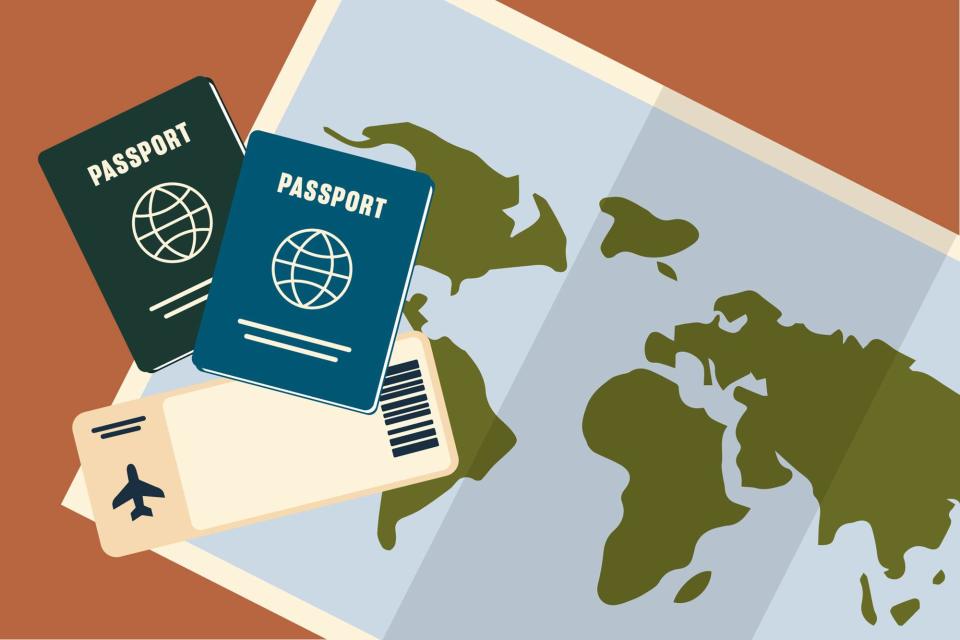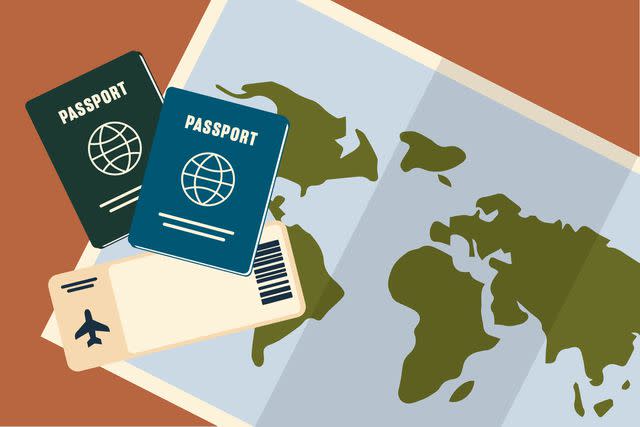Yes, You Can Have Multiple Passports — but Here's What You Need to Know
How many passports can you have? The answer might surprise you.

Travel + Leisure
A passport is a crucial document for every international traveler, no matter where in the world you come from. But did you know that it's possible to have multiple passports? Many countries around the world permit dual citizenship, which means individuals can hold passports from two or more countries. And if you're a U.S. citizen, you can even have more than one U.S. passport. Here's everything you need to know about holding multiple passports.
What are the benefits of having multiple passports?
It all depends on your individual situation — and the countries involved. From a travel perspective, it's all about access. "Possessing passports from multiple countries provides enhanced travel flexibility and mobility, unlocking visa-free access to more countries than what would be available with just one passport. Additionally, you have more residence options, allowing you to find a place that closely aligns with your personal inventions," Patricia Casaburi, managing director of investment migration firm Global Citizen Solutions, tells Travel + Leisure.

Travel + Leisure
For example, if you hold a European Union (EU) passport, that opens the doors to living and working across all member states. The same applies to citizens of countries in the Organisation of Eastern Caribbean States (OECS).
But having multiple passports isn't just about leisure travel or relocation. "Multiple citizenships serve as a plan B against unforeseen political, economic, or social developments," says Casaburi. "It adds a layer of protection, ensuring that in the event of any adverse circumstances or political turmoil in one country of citizenship, the individual retains the right to seek assistance and refuge in other countries."
Furthermore, having multiple passports can have financial and tax implications that benefit global investors.
Related: What Your Passport Color Really Means
How many passports can you have?
This all depends on your circumstances and is largely limited by the rules set down by any given country. In the United States, for instance, there is no limit to the number of citizenships you may hold — in theory, you could have passports from a dozen countries. But other countries — including China, Japan, Monaco, Ethiopia, the Bahamas, Venezuela, the United Arab Emirates, and Ukraine — do not recognize dual citizenship. In some cases, dual citizenship is permitted up to a certain age, often around 21 years old, and in others, dual citizenship is only permitted by birthright, not by other means such as investing. Dual citizenship can also limit your career prospects. In Australia, for instance, dual citizens are not permitted to become members of Parliament; similar laws are in effect in Israel, Kenya, Colombia, and the Philippines, among other nations.
Can you have multiple U.S. passports?
Yes, you can hold up to two U.S. passports simultaneously. According to the U.S. Department of State, second passports may be issued to individuals who meet certain criteria. That includes people who make frequent international trips that require multiple visas. If you must send your passport away to get a visa, as in the case of applying for a Chinese visa, not having your passport for a few days would impede your ability to travel abroad.
Another reason you may apply for a second passport is if "[a] foreign country will deny a visa or entry to you because your passport has stamps showing travel to certain countries." That's most common with Israeli stamps, which could prevent you from entering certain Middle Eastern countries. Second passports have all the same information as your first passport, except for the passport number, and they're only good for four years instead of 10.
Related: How to Get a New Passport as Quickly as Possible
Which countries allow dual citizenship?
As noted above, many countries do not allow dual citizenship. Approximately half of the countries in the world allow dual citizenship with the U.S. in some capacity, but because citizenship laws are so varied, we suggest looking at the government websites of each country to find out if dual citizenship is permitted — and if it is, what the restrictions might be.
How to Get a Second Passport
If you're looking to get a second U.S. passport, the process is akin to applying for your first passport; you can find out more at travel.state.gov.
But if you want to obtain a second passport via dual citizenship, that's a different story. "Acquiring multiple citizenships can be a complex process and varies from country to country and person to person," says Casaburi, who named the following methods among the most common paths to dual citizenship.
Related: You Can Legally Buy a Passport From Another Country — If You Can Afford the Investment
Birthright Citizenship
"Almost all countries have a form of birthright citizenship either through place of birth or blood relatives," says Casaburi. The former method is known as jus soli and the latter as jus sanguinis or jure sanguinis. "Being born in one country and your parents originating from another can potentially allow you to acquire citizenship from both your country of birth and your parent's country of origin or citizenship," Casaburi adds.
Citizenship by Descent
"Besides parents, some countries grant citizenship through other blood relatives, including grandparents and sometimes ancestors further down the parental line," says Casaburi. Some countries that allow citizenship by descent include Italy and Ireland.
Citizenship by Naturalization
"This is the process of becoming a citizen of a country by meeting specific residency requirements, language proficiency tests, and demonstrating knowledge of the country's history, culture, and laws," says Casaburi. "Some countries have more lenient naturalization processes, such as a shorter minimum residency requirement, while others may require you to have paid taxes or have no long periods spent outside the country."
Citizenship by Marriage
Although marrying a foreign national means either spouse can potentially earn citizenship by naturalization, "marriage often waives or lessens specific prerequisites for naturalization, such as minimum residency and language requirements," says Casaburi.
Investment and Economic Citizenship
"Several countries have provided a fast-track route to citizenship, granting individuals who make substantial financial contributions to the nation citizenship in return. Common citizenship by investment options includes real estate purchases, donations, creating businesses, and capital contributions," says Casaburi. She notes that the lowest investment cost of a second citizenship program is $100,000, which you'll find in some Caribbean countries. But head across the pond to Europe, and the lowest is €690,000 in Malta.
Overall, the process of achieving dual citizenship will likely take months to years — but it could be worth the hassle, depending on your situation.
For more Travel & Leisure news, make sure to sign up for our newsletter!
Read the original article on Travel & Leisure.

